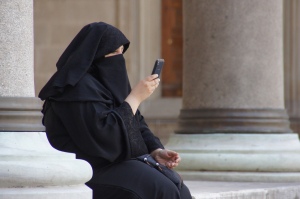This article was first published in the Oxford Student newspaper.

The latest comments of Home Office minister Jeremy Browne have helped ignite a debate about the freedom to wear veils in schools and public places. Others have joined, arguing that the niqab should be banned because it is a ‘worrying symbol of segregation’ within our education system. Whilst segregation in schools is concerning, religious attire seems like an odd, rather insignificant target, since segregation is endemic throughout our children’s schools. Our education system is rife with state-funded grammar, faith and state-propped private institutions. It is on this topic that debate is needed, not some inflated concern about Islamic dress, ultimately designed, like recent publicity stunts, to claw back some UKIP popularity.
Firstly, look at grammar schools, and the bizarre system they propagate, whereby the Eleven plus exam divides students into two groups based on supposed intelligence. Not only does it not work – it is less of a test of a child’s intelligence and more of a test of how able their parents are to afford ridiculous tutoring costs (grammar school admission consists on average of only 2% of children on free school meals), but even if it was accurate, why on earth would we want it? What exactly is acceptable about segregation based on a child’s supposed academic ability? Because grammar schools are so successful, we’re told. Well yes, they achieve good results, but is that a surprise considering they hand-pick students from families which are often so keen to pay huge sums to tutor their children? It’s not just wrong to analyse the efficacy of academic selection by only considering the outcome of half the schools, it’s totally flawed.
Let’s apply the same logic to healthcare, another human right which is largely state-maintained. Imagine if we had two types of hospital – one which took the more difficult cases – the diabetics, the complex heart surgeries, the malignant cancers, whilst the other one dealt with the easier cases, yet they received similar funding. Would it be any surprise when the second hospital achieved excellent patient care and results, whilst the first buckled under pressure? No, of course not, and the same is true in education, where we see grammar schools, full of their cherry-picked students, excelling in league tables. The reason the above analogy is so ridiculous is because we all understand healthcare to be a right, and so we allocate based on need. It’s time we had an education system that did the same.
Faith schools are another champion of segregation, which not only admit students based on their parent’s church-going habits, but then use their role as educators to preach insular religious views to their homogeneous classes . Jeremy Browne worries that young Muslims are having the Burqa ‘imposed’ on them – has he been to his local faith school I wonder? There he’ll be greeted with prayer, homophobia, and the denouncing of scientific principles, whilst sexual health teaching is neglected. What good comes from ensuring Catholic children learn alongside only Catholic children, does this segregation not serve only to breed ignorance and intolerance?
Furthermore, it is essential that in a society government spending provides based on need, for all. Imagine having state-funded Catholic hospitals for only Catholic patients, or to have libraries which only Hindus can enter. These examples seem ludicrous because we agree that state provision needs to be accessible by all who need it, and it is here where faith schools fail. And not only do faith schools limit the choice of parents who don’t want their child to face religious indoctrination, but they then promote the formation of homogeneous isolated social groups – the true enemy of multiculturalism, tolerance and a progressive society.
Finally, 7% of our children are still attending private schools – another great tool of social stratification. If segregating on supposed academic ability and the religion of a child’s parents isn’t enough, wealth is still a huge determinant on a child’s education and social upbringing. Perhaps the government isn’t to blame for this one, the schools are private after all, but this is not so. The charitable status given to public schools grants them tax breaks and helps to ensure their survival. Quite what is so charitable about Eton, I don’t know – I see a commitment to preserving inequality and hereditary privilege more than any truly altruistic aim, and the sooner we realise this, the closer we will be to achieving equality.
In summary, what we need are our schools to represent the diverse society that Britain is. Education in its simplest form is preparation for life, so why do we filter the people our children learn with? We continue to confine our children’s experience, their tolerance, and their friendship groups to a particular religion, social class or IQ bracket and it is this which is the true segregation in the British education system.
Oh, and the country that tops worldwide education reports? Finland, where charging school fees is illegal, religious schools don’t exist and no academic streaming or segregation happens before preparation for university. Debate all you want the importance of religious dress in schools, but Britain can have bigger aspirations.
Related articles
Having benefitted hugely from the system of academic selection in Northern Ireland myself, I agree with you totally that it’s morally wrong and must be abolished.
Sadly, things are only getting worse in the homeland, they’ve killed two birds with one stone – now there are TWO eleven plusses, one for so called ‘protestant children’ and one for so called ‘catholic children’. This way, they not only segregate by imposed religion, but by education too. And because you have to pay to sit the tests and it’s optional, they throw some segregation by class in there too!
It’s a wonder that we even bother sitting GCSEs in Northern Ireland, given that we’ve already been through so many assessments before we get through the school gate.
LikeLike